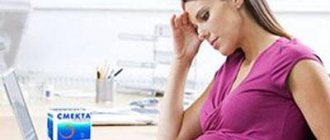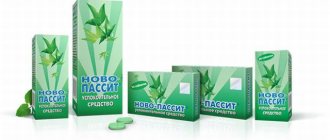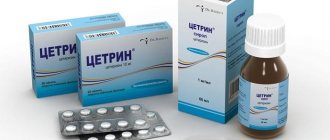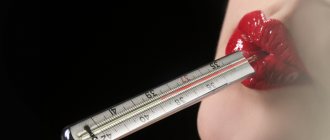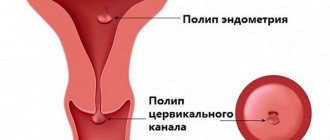The effect of iodine during pregnancy
Is iodine necessary during pregnancy? Understanding its functions in the body during the perinatal period will help answer this question:
- Iodine is part of the thyroid hormones and is responsible for the proper functioning of metabolic processes in the body;
- takes part in the transport of ATP molecules to cells;
- normalizes the functioning of the nervous system and heart.
An insufficient amount of this microelement can cause serious deviations in fetal development.
Women who get enough iodine during pregnancy feel great throughout its development.
They practically do not experience depression or increased anxiety, weight gain remains within acceptable limits, and they are always accompanied by a good mood.
About iodine deficiency during pregnancy
In Russia, insufficient amount of iodine in the body is a common phenomenon in medical practice.
Symptoms of iodine deficiency:
- decreased activity of the immune system;
- constant feeling of fatigue, general weakness of the body, desire to sleep;
- thyroid diseases.
A lack of microelement in the mother's body negatively affects the child's condition. Against the background of this condition, he may develop:
- dementia;
- pathologies of the brain structure;
- underdevelopment of the bone apparatus.
Pregnancy with iodine deficiency is always more difficult than in other women.
Toxicoses, threat of miscarriage, miscarriages, insufficient labor – this is an incomplete list of possible complications due to iodine deficiency. Therefore, pregnant women need to consult not only a gynecologist, but also an endocrinologist, who will determine whether the woman needs to take additional iodine.
Prevention and treatment of iodine deficiency
We will especially notice iodine deficiency in the autumn-winter period, when our diet is dominated mainly by refined foods, poor in vitamins and microelements. At this time, the basal metabolism decreases, since the thyroid gland works as if at “low speeds,” and we feel these manifestations as lethargy, apathy, weight gain and fatigue.
There are many ways to saturate the body with iodine, explains gynecologist-endocrinologist Irina Stoleshnikova: they have varying degrees of reliability and varying degrees of aggressiveness. According to the Ministry of Health, Russian residents on average consume about 40-80 mcg of iodine per day, while the daily iodine requirement for an adult is 100-150 mcg, and for a pregnant and lactating woman - 200 mcg.
Foods rich in iodine
. To prevent iodine deficiency, it is enough to regularly eat foods fortified with iodine. The first place among such products is occupied by iodized salt, which contains potassium iodide. To prevent iodine deficiency, it is enough to consume 5-6 grams of this salt with food daily. It is better if the salt contains K iodate (rather than iodite), then it retains its properties longer. But iodine evaporates easily, so iodized salt requires a more careful attitude. Firstly, the shelf life of such salt usually does not exceed three months and expired salt no longer contains iodine. Secondly, iodized salt should be packaged in an opaque plastic bag or foil and stored in a container with a tight-fitting lid. And thirdly, foods should be salted after cooking, since iodine evaporates quickly at high temperatures. Fish, seafood, seaweed, persimmons, sweet peppers and feijoa are rich in iodine. But white cabbage and radish, on the contrary, wash out the already small amount of iodine from the body. Therefore, doctors do not approve of the cabbage diet that has become widespread recently. But in order for the body to absorb the necessary mineral, first of all, the gastrointestinal tract must be healthy. Colitis, gastritis, duodenitis and other similar diseases interfere with intestinal absorption. And then no matter how much you consume iodine-rich foods, everything will pass by its destination. Therefore, during pregnancy, a woman should pay special attention to her intestines and, if they malfunction (constipation), regularly flush them with water.
Iodine-containing food supplements
, allowing for individual regulation of iodine in the body of the expectant mother. The iodine contained in these supplements, bound to the protein - casein, enters through the digestive tract into the liver, and then, under the action of enzymes, the body takes exactly as much iodine as it needs. The more acute the lack of iodine, the more active the enzymes become and, accordingly, the thyroid gland begins to intensively draw it from the liver. As a result, it takes exactly as much iodine as needed. And excess iodized protein is eliminated from the body naturally. However, before taking dietary supplements containing iodine, it is necessary to ensure that the person does not have an overactive thyroid gland. Thyroid dysfunction is sometimes almost impossible to notice right away. A doctor should prescribe a dose of special iodized drugs only after a special analysis of hormones.
Iodine injections for expectant mothers
. They can be done both during pregnancy and shortly before planned conception. The effect of one injection is prolonged and will provide the woman with iodine for the entire pregnancy. If the dose of the drug is prescribed correctly, there will be no side effects or negative consequences of such therapy.
Foods rich in iodine
If you create the right menu, you can completely meet the need for iodine without resorting to taking medications. To do this, you need to eat foods that contain large amounts of this element.
These include:
- liver of marine fish, especially cod;
- sea fish;
- shrimps;
- oysters;
- kelp or seaweed;
- feijoa;
- apples;
- persimmon;
- meat;
- spinach.
To increase iodine concentration, it is recommended to diversify your diet with seafood and fish. However, in order for the microelement to enter the body in maximum quantities, foods must be properly prepared.
The iodine molecule is very unstable and is easily destroyed under strong influence of external factors.
Thus, products cannot fully meet the body's need for microelements. Therefore, it is recommended to take special vitamins for pregnant women with iodine.
Rules for processing and storage of iodine-containing products
The maximum amount of iodine is found in fresh seafood and fish. Improper storage and preparation can significantly reduce the amount of this trace element.
For example, the iodine content in fresh shrimp is 190 mcg per 100 g of product. During heat treatment, some of the molecules are destroyed and only 11 mcg of the beneficial substance remains in fried shrimp. Therefore, it is recommended to reduce the cooking time.
The preferred methods are steaming, baking, blanching.
In addition, it is recommended to use the freshest products possible. During long-term storage, iodine is also destroyed.
Fresh salmon contains about 200 mcg of the substance, and after freezing its concentration drops to 27 mcg.
In vegetables and fruits, the amount of iodine decreases sharply during mechanical processing.
Exposure to metal devices destroys many beneficial substances.
What foods contain iodine?
Many food products are rich in iodine, provided that the raw materials for them were grown in favorable conditions and all the rules for processing and preparation of the final product were followed. Obviously, in the modern world this is practically impossible: preservatives, GMOs, flavor enhancers and various chemicals turn healthy products into something incomprehensible and completely unhealthy.
The most reliable source of iodine today is iodized salt. This is one of the cheapest and most accessible products that expectant mothers should definitely buy and forget about regular salt. Iodized salt contains potassium iodide, which can prevent iodine deficiency if a woman consumes only 5-6 grams of salt daily.
True, this type of salt is extremely finicky: it requires special storage in opaque packaging (preferably foil), has a short shelf life (up to 3 months) and does not tolerate heat treatment. If the expectant mother really wants to benefit from this product, the food should only be salted when serving.
In addition to salt, fish, cod liver, seafood, seaweed, persimmon, sweet peppers and feijoa can compensate for iodine deficiency. With persimmons and red peppers, as well as with seafood, you need to be careful, not forgetting about possible allergies.
White cabbage and radish, for example, should be forgotten for 9 months: on the contrary, they flush iodine from the body.
Even if the expectant mother consumes iodine-rich foods every day, we must not forget about the examinations. If gastrointestinal diseases are present, there may be difficulties with the absorption of the element in the intestines. In this case, no matter how much you consume this useful microelement, it will still not reach its destination.
Iodized salt
One of the options for additional iodine intake is the use of iodized salt.
The product is obtained by enriching sodium chloride or ordinary table salt with potassium iodate.
It is recommended for use in regions where there is a deficiency of this microelement.
Iodized salt is a good preventive measure.
Has a number of contraindications:
- oncological neoplasms in the thyroid gland;
- tuberculosis of the lungs;
- formation of boils;
- excessive thyroid function;
- kidney pathologies.
If you have any of the diseases listed above, it is better to avoid using this product.
Currently, iodized salt is successfully used not only in cooking and canning, but also as a cosmetic product.
Drugs that replenish iodine deficiency in the body
Medicines that compensate for the lack of iodine in the body of a pregnant woman are made based on the active substance potassium iodide. The listed drugs are allowed for use during pregnancy in prophylactic doses under the supervision of a physician. An incorrectly prescribed dosage for a woman can lead to suppression of thyroid function, and cause its enlargement in the fetus. The microelement penetrates well through the placenta.
All presented vitamin-mineral complexes contain iodine in a dosage of 150 mcg. The doctor may prescribe the missing norm in the form of additional funds if a severe microelement deficiency is diagnosed. Before using any synthetic supplements, you need to make sure that the pregnant woman’s body urgently needs them.
Table: popular drugs prescribed to pregnant women for iodine deficiency
| Iodine preparations | Compound | Release form | Admission rules | Features of use during pregnancy | Indications | Contraindications | Manufacturer | Price, rub |
| Iodomarin | Potassium iodide | Tablets 100 and 200 mcg | As a rule, once in the morning after breakfast | The drug is approved during pregnancy for the prevention of iodine deficiency in the amount of 200 mcg |
|
| Germany | From 100 to 220 per package depending on the number of pieces (50 or 100) |
| Microiodide | Potassium iodide | Tablets 100 mcg | As a rule, once in the morning after breakfast | Can be used in recommended doses |
|
| Russia | |
| Potassium iodide | Potassium iodide | Tablets 100 and 200 mcg | As a rule, once in the morning after breakfast | Used as prescribed by a doctor |
|
| Russia | From 60 to 100 depending on the dosage. There are 100 pieces in a package. |
| Iodine balance | Potassium iodide | Tablets 100 and 200 mcg | As a rule, once in the morning after breakfast | Approved for pregnant women in recommended dosages. |
|
| Germany | From 100 to 170 depending on the dosage of 100 or 200 mcg |
| Complex vitamin-mineral products with iodine | ||||||||
| Alphabet mom's health | Contains 13 vitamins and 11 minerals, including taurine, iodine, and selenium. | Tablets, 60 pieces per pack. | 3 tablets per day. There are three reception options:
The manufacturer recommends the latter option as the most effective. | The complex was created specifically for pregnant and nursing mothers. | An additional source of essential vitamins and minerals during pregnancy and lactation. | Allergic manifestations to any component of the drug. | Russia | 379 |
| Vitrum Prenatal Forte | Balanced vitamin and mineral complex. | Tablets, 30 and 100 pieces per pack. | One tablet per day after meals. | Can be used both during pregnancy and in the preparatory and postpartum period. |
|
| USA | From 652 |
| Femibion Natalcare 2 | Essential vitamins and minerals for pregnant women | 30 tablets and 30 capsules in one pack. | One tablet and one capsule at a time during meals. | The manufacturer recommends from the 13th week of pregnancy until the end of the lactation period. | An additional source of essential vitamins and minerals during pregnancy and lactation. | Individual intolerance to the elements of the medication. | Switzerland | From 914 |
Photo gallery: approved iodine preparations during pregnancy
For the prevention and treatment of iodine deficiency, pregnant women are most often prescribed Iodomarin 200
During pregnancy and breastfeeding, the need for iodine increases, so it is especially important to use the drug Iodine Balance in sufficient doses to ensure adequate iodine intake in the body
During pregnancy and breastfeeding, Potassium iodite can only be used in physiological (prophylactic) doses
Doctors are less likely to prescribe the drug to pregnant women, since it is only available in a dosage of 100 mcg
Foods that interfere with iodine absorption
Abuse of certain foods can lead to a decrease in the amount of iodine in the body. This is due to the fact that they contain substances that destroy the structures of the iodine molecule.
These products include:
- flax-seed;
- soya beans;
- various types of cabbage - white cabbage, Brussels sprouts, broccoli, cauliflower.
In addition to foods, some groups of medications interfere with the absorption of iodine:
- penicillins;
- streptomycins;
- chloramphenicol;
- hormonal drugs;
- acetylsalicylic acid or aspirin;
- bromine-containing drugs.
Pregnant women are advised to carefully plan their diet.
Food Sources of Iodine
Basically, iodine enters our body through food, which penetrates from the soil - for plants, from food - for fish and animals.
At the same time, sea and ocean fish naturally have iodine in excess, which cannot be said about continental plants and animals. If you consider that they contain iodine from 20 to 50 mcg per kilogram of weight, then you need to consume 4-10 kg of food that is useful in this case per day, which is unrealistic. To correct the situation, you need to add river and sea fish, seaweed and seafood to your menu. Most iodine is found in freshwater fish. Iodine is added to livestock feed in some countries. This element is added to salt, bread and dairy products.
We are most familiar with iodized salt. It turns out that we can get iodine from food in two ways:
- Eat fish and seafood, as well as seaweed, at least 1-2 times a week.
- Add salt fortified with iodine or other foods rich in iodine to your food.
Oddly enough, sea salt contains very little iodine. You have to be content with iodized one.
Daily value of iodine for pregnant women
The iodine requirement for pregnant women is 250 mcg per day. However, this figure is conditional. How much iodine you need per day will be determined by an endocrinologist or gynecologist who monitors the pregnancy. To do this, it is necessary to check the functional activity of the thyroid gland. It is better to do this before conception at the planning stage.
If the dosage is calculated incorrectly, an overdose of iodine may occur during pregnancy. This can also harm the health of not only the expectant mother, but also the baby.
Particular care should be taken when consuming iodine in early pregnancy. During this period, active formation of all the child’s organ systems occurs and harm can be done very easily.
Iodine is an essential trace element in the life of the human body. The need for it increases during pregnancy.
In regions where there is a deficiency of this chemical, doctors recommend that women take special iodine preparations for pregnant women. They help meet the needs of the mother and child for this element.
You cannot decide on your own whether to take such medications. Only a doctor can determine the dosage, course duration, and method of using iodine during pregnancy.
Should I take dietary supplements containing iodine?
Fortunately, the pharmaceutical industry offers an abundance of useful nutritional supplements, among which iodine-containing preparations occupy a special place.
Is there a need for them during pregnancy? Having assessed your drowsiness and apathy, you should, of course, not run to the pharmacy. If multiple examinations show that the expectant mother is experiencing iodine deficiency, she will need to undergo another simple diagnostic procedure that will determine whether the woman has hyperthyroidism. After the examination, the doctor may prescribe a supplement. The dosage and course of treatment is determined individually.
If the problem of iodine deficiency is urgent and even eating iodine-rich foods does not help, your doctor may prescribe iodine supplements. The microelement is present in them in a protein-bound state, which allows this “complex” to pass through the digestive tract to the liver. Then, under the action of enzymes, the body takes from there as much iodine as it needs. The rest is eliminated from the body naturally.
Iodine preparations
When taking iodine supplements, you need to take into account that you get a certain amount of iodine from food (on average it is 40 mcg/day). Additionally, many prenatal multivitamins also contain iodine. The amount of iodine taken should not exceed 200-250 mcg/day. Usually during pregnancy, drugs are prescribed with a dose of 200 mcg of iodine, but if iodine is contained in the multivitamins that the woman takes, this dosage should be adjusted.
Recommended dosages of iodine (mcg/day) for pregnant and lactating women, adopted in various countries of the world
| A country | Australia (1990) | UK (1991) | Germany, Austria | WHO | USA/Canada (2001) |
| Pregnancy | 175 | 140 | 230 | 200-250 | 220 |
| Lactation | 200 | 140 | 260 | 200-250 | 290 |
Modern preparations contain iodine in the form of potassium iodide and iodocasein.
| Name | Release form | Packaging, pcs. | Manufacturer country | Price in Russia |
| Jodbalance | tablets 100mcg | 100 | Germany, Merck | 72- (average 107) -118 |
| Jodbalance | tablets 200mcg | 50 and 100 | Germany, Merck | 136- (average 176) -191 |
| Iodomarin 100 | tablets 100mcg | 100 | Germany, Berlin-Chemie | 115- (average 145) -208 |
| Iodomarin 200 | tablets 200mcg | 50 and 100 | Germany, Berlin-Chemie | for 50pcs: 108- (average 137) -209; for 100pcs: 145- (average 219) - 257 |
| Potassium iodide (potassium iodide) | tablets 100mcg | 50 and 100 | Russia, Obolenskoye | for 50pcs: 34- (average 40) -80; for 100pcs: 58- (average 71) -115 |
| Potassium iodide (potassium iodide) | tablets 200mcg | 100 | Russia, Obolenskoye | 41- (average 107) -119 |
| Iodine Vitrum Kids | tablets 100mcg | 60 | USA, Unifarm | No |
| Iodine Vitrum | tablets 100mcg | 120 | USA, Unifarm | No |
| Iodine Vitrum | tablets 200mcg | 120 | USA, Unifarm | No |
| Iodide 100 | tablets 100mcg | 100 | Germany, Merck | 43- (average 53) -75 |
| Iodide 200 | tablets 200mcg | 50 | Germany, Merck | No |
| Potassium iodide 200 Berlin-Chemie | tablets 200mcg | 50 and 100 | Germany, Berlin-Chemie | 35- (average 113) -224 |
| Microiodid | tablets 100mcg | 50 | Russia, Tatchimpharm | 48- (average 57) -102 |



